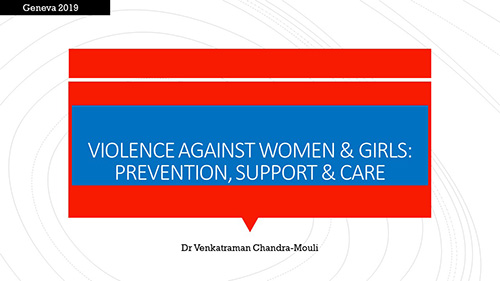Adolescent sexual and reproductive health - Course files
Violence against women and girls: prevention, support and care
Venkatraman Chandra-Mouli
Training course in adolescent sexual and reproductive health 2019
October 21, 2019 - Geneva
Download the complete document
Chandra-Mouli V. Violence against women and girls: prevention, support and care. Paper presented at: Training course in adolescent sexual and reproductive health; 2019 Oct 21; Geneva.
Tasks
- Go over the slide set titled: Violence against women and girls: prevention, support and care (Violence against women and girls: prevention, support and care with talking points) which contains key messages from the WHO publication: WHO recommendations on adolescent sexual and reproductive health and rights (2018).
- Go over the slide set titled: Implementing a public health approach to violence against women.
- Go over the WHO publication titled Global Plan of Action: Health systems address violence against women and girls (2016).
- Go over the WHO publication titled Respect women: Preventing violence against women (2019).
- Go over the relevant pages of the WHO publication: WHO recommendations on adolescent sexual and reproductive health and rights (2018).
Reference document
Assignment
Go over the module materials provided and answer the following five questions with the aid of the clues provided.
Question 1
Name 3 forms of gender-based violence that you are aware of, occurs in your community/country.
4 marks
Clue: Study slide 2 in the slide set titled: Implementing a public health approach to violence against women, and page 5 of the of the WHO publication: Global Plan of Action: Health systems address violence against women and girls.
Question 2
Gender-based violence has negative consequences to women and girls, their families, and their communities and societies. Name three such consequences.
4 marks
Clue: Study pages 8, 9 and 10 of the WHO publication: Global Plan of Action: Health systems address violence against women and girls, and page 51 of the WHO publication: WHO recommendations on adolescent sexual and reproductive health and rights.
Question 3
In many places health care providers do not respond effectively and with sensitivity to women and girls who experience gender-based violence. Firstly, in your opinion, why is this so? Secondly, name three things that could be done to change the situation.
6 marks
Clue: Study pages 10 to 14 of the WHO publication Global Plan of Action: Health systems address violence against women and girls, and page 55 of the WHO publication: WHO recommendations on adolescent sexual and reproductive health and rights.
Question 4
Firstly, what are the seven strategies that comprise RESPECT? Secondly, what do R and T stand for, and what is the evidence of the effectiveness of both? Thirdly, what will it take to implement R and T in your context?
8 marks
Clue: Study slide 8 in the slide set titled: Implementing a public health approach to violence against women, and pages 6 to 10 in the WHO document titled RESPECT.
Question 5
Gathering and using data on violence against women and girls is important. Identify three actions that you believe all countries could carry out immediately.
3 marks
Clue: Study page 25 of the WHO publication Global Plan of Action: Health systems address violence against women and girls, and page 12 of the WHO publication RESPECT.
Best assignments of week 7: Violence against women and girls: prevention, support and care
Congratulations to the following participants whose assignments have been chosen as the best assignment of week 6 by their coaches. Click on the participant’s name to read the assignment.
Diana Opollo, ADRA Canada, Newcastle, Canada
Coach’s comment
"Study materials are well-researched and you have answered the questions to-the-point and included additional relevant resources." Ashim Roy, GFMER country coordinator and course tutor
Eyob Gebretsadik, World Health Organization, Addis-Ababa, Ethiopia
Coach’s comment
"We all understand that module 7 deals with the most neglected but the most prevalent health problems of girls and women in our communities, particularly in MLIC countries. Due to this, some discussion topics and assignment questions are new for us though all the course participants reviewed and tried to understand all the relevant materials, which they did not come across during their pre-service or in-service trainings. For this week, the assignment paper of Eyob Gebresadik is selected for effectively and precisely addressing all the questions. The participant also tried to search and review research papers that conducted on VAW/GBV in his home country. Finally, I appreciate all the participants, especially those participants who are doing their best to complete and submit the assignments despite their work overload and difficulties to access internet connection." Melaku Samuel Hottessa, GFMER course tutor
Maryam Muhammad Zakari, Federal Staff Hospital, Gwarinpa, Abuja, Nigeria
Coach’s comment
"The participant has continuously maintained an ability to "see the big picture", questions are responded to in a concise way with relevant references to country and community specific data." Aishatu Abubakar-Sadiq, GFMER country coordinator and course tutor
Nefertari Boles, Young Scholars of Egypt, Cairo Governorate, Egypt
Coach’s comment
"The power of repeating yourself is influential. It is an essential tool for any successful person to see the results they desire. Indeed. Congrats Nefertari!" Khadija Ahmed Matrook, GFMER country coordinator and course tutor
Sahil Chopra, Jhpiego, New Delhi, India
Coach’s comment
"I am happy to nominate Sahil Chopra for the 7th module." Lela Shengelia, GFMER country coordinator and course tutor
Verena Berndt, Plan International, Hamburg, Germany
Coach’s comment
"I appreciate the efforts of all my participants this week. I enjoyed reading your various enlightening views on this topic. This assignment is selected as the best for the week because the participant demonstrated an excellent knowledge of the module. Her answers were well articulated, to the point and appropriately related to her country situation." Raqibat Idris, GFMER course coordinator and tutor
